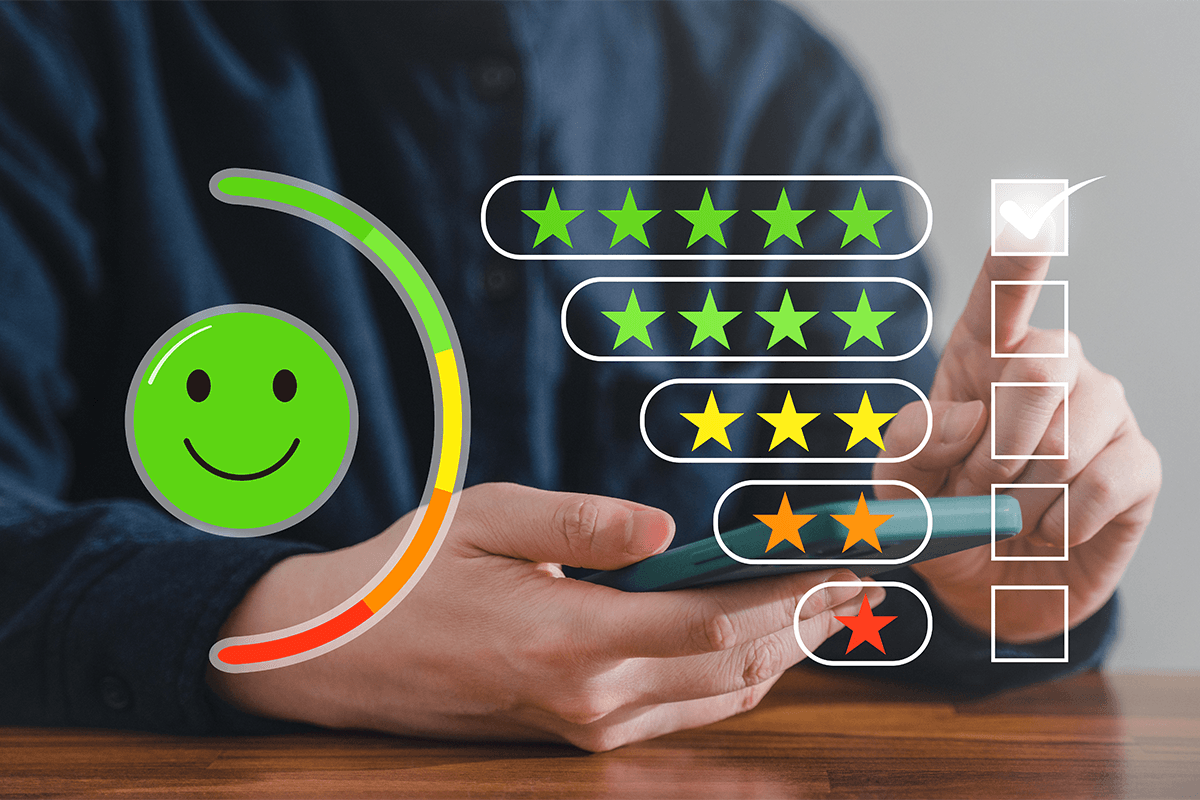Running a successful service-based business has become a challenge in this fast-paced world. Satisfying customers with their requirements and maintaining the brand value at the same time is the ultimate goal of the businesses. In the hospitality industry, particularly in hotels, the entire source of success is dependent on customer feedback.
The feedback system is a powerful tool that helps businesses understand their customers’ experiences, identify areas for improvement, and enhance overall customer satisfaction. Implementing an effective feedback system is crucial for maintaining high standards of service and continuously enhancing the guest experience.
Elevate your guest experience with piHappiness!❤️
Discover how our hotel feedback system can drive improvements and boost satisfaction
In this blog, we will find multiple ways to implement a successful feedback system in hotels. This will enable your business to find areas to improve.
Guest Surveys and Questionnaires:
One of the most common methods of collecting feedback is through guest surveys and questionnaires. These can be distributed digitally through email or on physical forms during check-out. Design the surveys to capture insights on various aspects of the guest’s stay, including room quality, cleanliness, staff behavior, amenities, and more. Keep the surveys concise and easy to understand, and consider offering incentives, like discounts on future stays, to encourage participation.
Real-time Feedback Kiosks:
Implementing real-time feedback kiosks in common areas of the hotel, such as the lobby or near restaurants, allows guests to share their experiences. It also helps in gathering feedback right after interacting with a specific service. These kiosks can offer touchscreen interfaces with multiple-choice questions and open-ended fields for comments. This approach captures immediate feedback, enabling prompt responses to any issues during the guest’s stay.
Digital Platforms and Social Media:
Utilize social media platforms, review websites, and hotel websites to create an online space where guests can provide feedback. Encourage customers to provide their experiences and opinions openly. Respond to their reviews, whether positive or negative, to demonstrate your commitment to addressing concerns and improving services. Social media also provides a platform for ongoing engagement with guests, building a community around your hotel.
Guest Feedback Software:
Develop a dedicated mobile app for your hotel that allows guests to provide feedback and suggestions. This guest feedback software or app can include features like chatbots for instant assistance, the ability to rate different services, and a section for leaving comments. This makes it convenient for guests to share their experiences, and it’s also an opportunity to showcase the amenities and services your hotel offers. Hotel guest feedback software will not only build the brand’s reputation but will gain the customer’s trust.
Personalized Follow-up:
Consider sending personalized follow-up emails or messages after a guest’s stay to request feedback. This will showcase your responsibility and loyalty towards the customers. Express your genuine interest in knowing about their experience and suggestions for improvement. Personalization can enhance the guest’s perception of your commitment to their satisfaction and encourage them to provide detailed feedback.
Feedback Cards in Rooms:
This is one of the good methods that will enable customers to provide their feedback. You can simply place feedback cards in guest rooms that guests can fill out and drop off at the front desk during check-out. Make sure the questions are focused on aspects that directly impact the guest’s stay, such as room comfort, cleanliness, and staff interactions. Including prepaid postage or a convenient drop-off location can encourage more guests to participate.
Employee Feedback Channels:
Feedback doesn’t just come from guests; employees are a valuable source of insights as well. Establish internal feedback channels that allow staff to express their suggestions and observations to improve the guest experience. This enables a culture of constant improvement and demonstrates that the employee’s opinions are valued. Such valuable feedback will enable your business to grow for a very long period.
Data Analytics for Insights:
Implement data analytics tools to analyze the feedback data collected. Identifying patterns and trends can help you pinpoint areas of concern and prioritize improvements. For instance, if multiple guests mention slow Wi-Fi, you can address this issue to enhance the overall guest experience. This immediate action will create a positive state of mind in the customers, enabling good feedback.
Hotel Reputation Software:
Hotel reputation software, also known as online reputation management software for hotels, is designed to monitor, manage, and improve their online reputation. It is also used to collect the customer’s positive and negative notes about your hotel. Online reviews, ratings, and comments play a crucial role in influencing potential guests’ decisions when choosing accommodations. Hotel reputation software assists hotels in effectively managing their digital presence and enhancing their reputation. They provide tools to gather, analyze, and respond to guest feedback and reviews across various online platforms.
How to Design a Feedback System?
- Understand the Needs of Your Guests:
To craft an effective feedback system, begin by understanding needs and anticipations regarding your hotel. Involve in the latest technologies or gather information through surveys, interviews, focus groups, or online reviews. Make your major focus on the hotel-required questions like cleanliness, comfort, amenities, staff, cuisine, and location. Furthermore, categorize your guests based on varying criteria, like age, gender, travel purpose, and duration of stay, to pinpoint their distinct requirements and inclinations.
- Select the Suitable Feedback Tools:
Customer feedback software in the hotel industry is the only way to constantly develop in terms of business. Analyze and use the proper tools to gather feedback suitable to your hotel. These tricks will help you to strategize, collect, and act on the data properly. Instead of wasting time, your staff can act on collecting both qualitative and quantitative data to get a strong acknowledgment. This will help to grow your business by avoiding silly mistakes.
- Simple Process of Feedback Systems:
There are multiple ways, tools, and software to retrieve customer feedback status. However, a simple and easy procedure to understand your customer’s perspective will make it a lot easier for you and them. Try implementing the general forms by adding friendly questions or providing a discount-based feedback card, which will encourage people to visit your hotel more and give appropriate feedback.
- Respond at the Earliest:
Always make sure to attend to your guests in the utmost polite and fastest manner. Resolving issues on time will make a good impression on the customers. In this case, sometimes customers tend to avoid the faults or mistakes the management made. Guest feedback in hotels becomes vital in these kinds of situations.
Implementing a comprehensive feedback system in your hotel not only enables you to provide a better guest experience but also demonstrates your commitment to continuous improvement. By actively seeking and acting upon guest feedback, you create a positive impression that resonates with and potential guests alike. Remember, the goal is not just to collect feedback but to use it to elevate your hotel’s service standards and exceed guest expectations.
Frequently Asked Questions:
1. Why is implementing a feedback system important for hotels?
Implementing a feedback system allows hotels to gather valuable insights from guests, identify areas for improvement, and enhance overall guest satisfaction.
2. What are the common methods of collecting guest feedback in hotels?
Common methods include guest surveys and questionnaires, real-time feedback kiosks, digital platforms, guest feedback apps, and personalized follow-up emails or messages.
3. How can hotels encourage guests to provide feedback?
Hotels can encourage feedback by offering incentives such as discounts, creating easy-to-use feedback methods, and expressing genuine interest in hearing about the guest’s experience.
4. What benefits does real-time feedback through kiosks offer?
Real-time feedback kiosks allow guests to share their experiences immediately after interacting with a specific service, enabling prompt responses to issues and enhancing the overall guest experience.
5. How can hotels utilize digital platforms and social media for feedback collection?
Hotels can create an online space on social media, review websites, and their own websites where guests can leave feedback. Engaging with guest reviews and comments demonstrates the hotel’s commitment to improvement.
6. What is the role of personalized follow-up in feedback collection?
Personalized follow-up emails or messages after a guest’s stay show genuine interest in their experience and encourage them to provide detailed feedback.
7. How can internal feedback channels involving employees contribute to guest satisfaction?
Employees often have valuable insights into guest experiences. Internal feedback channels foster a culture of improvement and demonstrate that employee opinions are valued.
8. Are feedback cards in guest rooms an effective method?
Yes, feedback cards in guest rooms provide guests with a convenient way to share their experiences and suggestions, helping hotels gather feedback before check-out.








